
Indicator scoreboard
EMU - Third quarter gross domestic product rose 0.7 percent and 3.4 percent when compared to last year. The third quarter GDP increase was due mainly to stronger gross fixed capital formation and a rise in inventories. Consumers spent less than in the previous quarter and the trade balance subtracted from GDP.
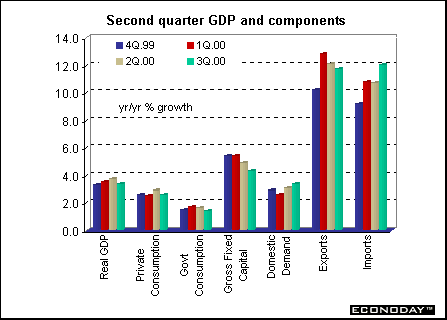
Germany - October seasonally adjusted real retail sales including autos and gasoline dropped 0.2 percent and were down 2.3 percent when compared with last year. Real seasonally adjusted retail sales excluding autos and gasoline were up 0.1 percent but were down 1.5 percent when compared with last year.
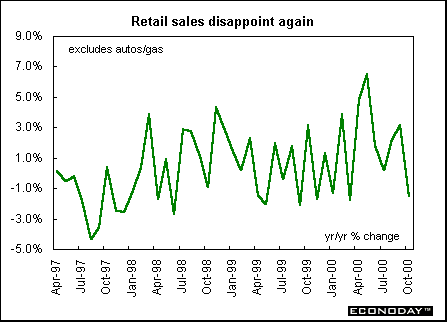
November Ifo Institute's west German business sentiment index fell to 97.0. This was the sixth consecutive decline, pushing the index to its lowest level since October 1999. A sharp decline in business expectations was partly offset by a rise in current conditions. Future expectations fell to 101.6 from 103.2 in October, while sentiment on current business conditions rose to 92.4 from 91.3 in October. Ifo's east German business confidence index jumped from 103.8 in October to 106.3 in November. Both current conditions and expectations rose during the latest month.
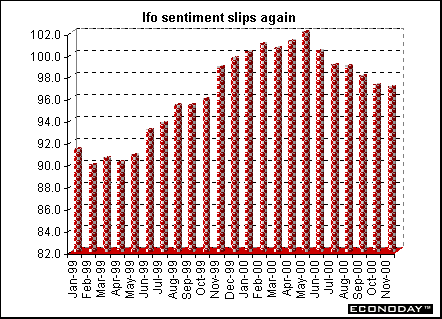
October seasonally adjusted merchandise trade surplus was E5.5 billion on a nominal basis, up from an E3.8 billion surplus in September and up from E5.0 billion in October 1999. Exports adjusted for seasonal variations but not for price differences were up 7.9 percent on the month and up 27.7 percent on the year. Imports were up 4.7 percent on the month and 30.1 percent on the year.
October seasonally adjusted industrial productivity per employee and per hour worked in the manufacturing and mining industries fell 0.7 percent and was 5.0 percent above the year earlier level. In September, productivity per employee declined 0.8 percent but was up 6.7 percent when compared with last year.
November wholesale prices fell 0.2 percent but were up 6.4 percent when compared with last year. Excluding seasonal food prices, wholesale prices fell 0.4 percent on the month but rose 6.2 percent on the year. Excluding oil products, wholesale prices rose 0.4 percent on the month and 3.5 percent on the year.
France - October seasonally adjusted merchandise trade balance fell to a deficit of E760 million. Exports dipped 0.3 percent, erasing September's increase. For the three months through October, exports were up 1.4 percent over the previous three month period and 11.9 percent higher on the year. Exports stagnated in all main industry sectors. October imports rose 2.5 percent. For August through October, imports were up 4.3 percent over the previous three month period and 20.9 percent higher on the year.
Italy - October seasonally and workday adjusted industrial production fell 0.8 percent but rose 0.5 percent when compared with last year. The decline was mainly due to heavy floods that hit northwestern Italy and caused major disruptions.
Britain - November seasonally adjusted producer input prices rose 0.5 percent and were up 10.8 percent when compared with last year. Higher energy prices were once again to blame for the increase. Crude oil prices rose 4.9 percent on the month and were up 47.4 percent on a year earlier. Seasonally adjusted core output prices, however, fell for the first since July 1999. This took the annual rate of core output inflation down to 0.8 percent from 1.0 percent.
November retail price index (RPI) rose 0.3 percent and 3.2 percent on the year. The retail price index excluding mortgage interest payments (RPIX) rose 0.3 percent and 2.2 percent when compared with last year. The retail price index excluding both mortgage interest payments and indirect taxes (RPIY) also rose 0.3 percent but was up 1.8 percent when compared with last year. The Bank of England uses the RPIX as its policy making inflation measure. Its current inflation target is 2.5 percent.
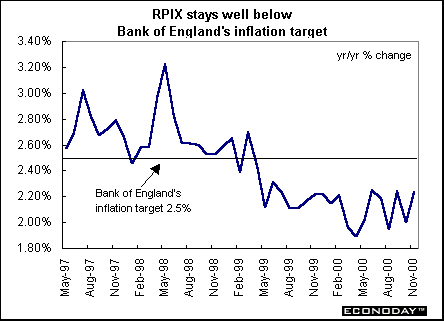
Average earnings jumped 4.2 percent in the three months to October from a rate of 4.1 percent in the previous three months. October earnings growth was 4.1 percent as lower bonuses than a year earlier depressed the latest month's data. Earnings growth in the manufacturing sector remained unchanged at 4.3 percent while it rose to 4.2 percent in the service sector from 4.0 percent in September. Earnings growth in the public sector remained unchanged at 3.4 percent while private sector earnings growth accelerated to 4.4 percent from 4.3 percent.
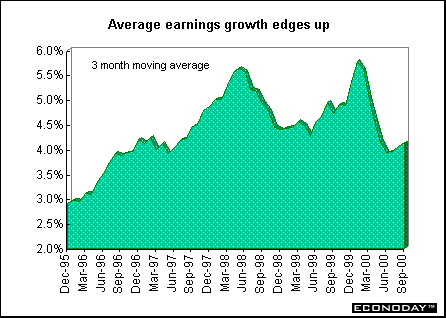
November claimant count unemployment rate was unchanged at 3.6 percent, the lowest rate since October 1975. Unemployment on the International Labor Organization measure in the three months to October rose by 36,000 on the previous period but was down 120,000 on the year. The ILO unemployment rate stood at 5.5 percent compared with 5.4 percent in the previous three months.
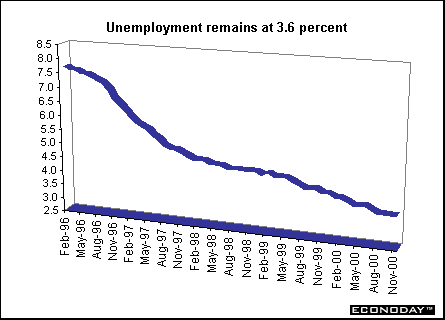
November seasonally adjusted retail sales volumes shot up 0.7 percent and 4.7 percent when compared with last year. The data defied expectations that the month's wet weather and chaos on the rail network would deter shoppers. In the three months to November, sales were up 1.4 percent on the previous three months and by 4.5 percent on a year earlier. Sales growth in the three months to October stood at 1.3 percent.
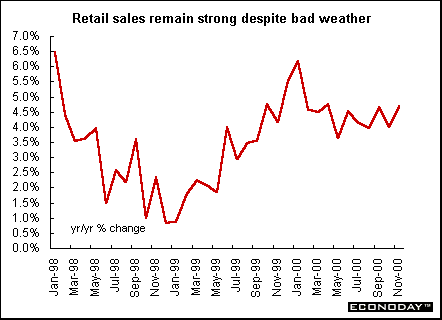
Asia
Japan - Fourth quarter Tankan survey of business sentiment was flat in the three months to December at plus 10 while expectations for March 2001 are for a drop to plus 7 in sentiment. The small companies sentiment index was minus 20, up from minus 22 in September. Manufacturers' sentiment crawled up to minus 16 from minus 17 in September, while non-manufacturers sentiment was minus 23 after reporting minus 24 in September.
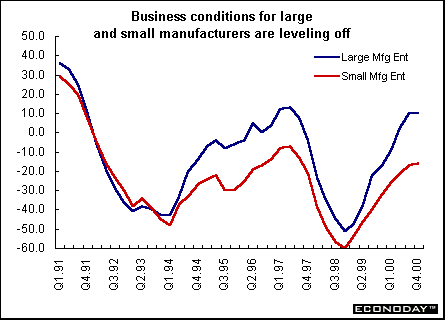
October seasonally adjusted current account surplus was down 9.6 percent and fell 28.6 percent when compared with last year. Exports rose 3.8 percent on the month and 7.4 percent on the year while imports were up 4.7 percent on the month and 26.7 percent on the year. The growth in the value of imports was largely because of higher crude oil prices. Imports of crude oil, mainly from the Middle East, grew 52 percent on the year in value, but only 7.4 percent in volume. Crude oil prices averaged $31.57 a barrel, up nearly 40 percent from October 1999. In yen terms, prices were up 42 percent.
Third quarter (July to September) corporate capital spending for all industries rose 0.2 percent from a year earlier. Manufacturers' spending on plant and equipment rose 13.0 percent while spending by non-manufacturers fell 5.9 percent.
Australia - November business confidence plunged 10 points, dented by higher oil and import costs, which came on top of a new tax system. The confidence index dropped to minus 3 in November from plus 7 in October. It is the first negative reading since minus 3.7 in June, which was a month before the introduction of the 10 percent goods and services tax (GST). Construction, retail, wholesale, manufacturing and transport industries posted the largest declines in confidence in the month.
Third quarter gross domestic product rose 0.6 percent and 4.2 percent when compared with last year. This is the slowest pace in over a year as business spent less on construction, compounding a 20 percent slump in housing investment. The Olympics and a new tax (GST) distorted the results. The best export performance in three years, boosted by the Olympic Games and a falling Australian dollar, offset a slower domestic economy.
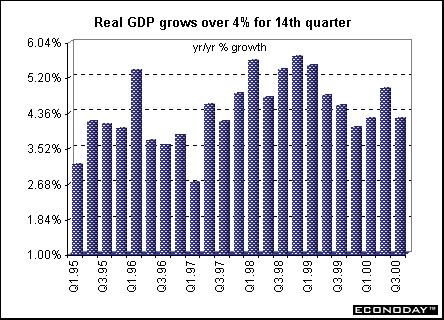
Americas
Canada - November seasonally adjusted consumer price index rose 0.5 percent and 2.9 percent when compared with last year. The CPI less food and energy rose 0.3 percent on the month and 1.7 percent on the year. On an unadjusted basis, the CPI rose 0.3 percent and 3.2 percent when compared with last year. Higher energy prices were once again the major contributor to the increase. The All items excluding energy index advanced by 1.8 percent compared with November 1999.
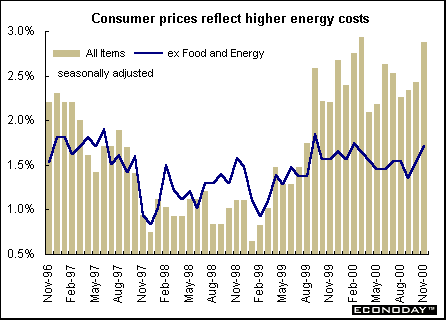


Introduction • Global Stock Market Indexes • Recap of Global Markets • Currencies • Indicator Scoreboard

The Bottom Line • Looking Ahead
© Econoday, 2000. All Rights Reserved.
|